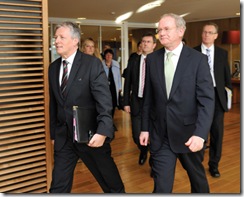A junior role?
Ryan Jennings looks at how junior ministers could be used more widely on the hill.
Junior ministers play a bigger part in politics outside Northern Ireland. Up on the hill Gerry Kelly and Robin Newton fill the roles in OFMDFM, but no other departments utilise the position despite being allowed to do so.
The position itself was established in the 1998 Northern Ireland Act. It said that the First Minister and deputy First Minister can at any time appoint “a number of members of the Assembly” as junior ministers.
The responsibilities for junior ministers, in whatever department, would be specified by the department. Taking those of OFMDFM, their role is assisting the ‘first ministers’ in carrying out their work, but they are also have more specific roles such as equality. Both the juniors are jointly accountable to Robinson and McGuinness, proving the any department with a junior minster would still be hierarchical.
Neither are official members of the Executive but they do attend meetings. They are specifically responsible for carrying through the Executive’s legislative programme and responses to Assembly questions.
The question must be asked, though, why the Executive’s smallest department is the only department to appoint junior ministers.
In spite of being perhaps the most widereaching department, there is only one DETI Minister, covering the economy, business, energy and tourism. That department has never made a request to appoint a junior, in spite of being allowed to do so.
OFMDFM was unable to confirm by the time of going to press whether any Executive department had ever made a request to appoint a junior.
Scotland, for example, has six departments, each with a Cabinet Secretary heading it up. There are also other ‘ministers’ with certain responsibilities within that department. Four departments make room for two ministers, while both the justice and rural affairs and environment departments have one a-piece.
In Holyrood, responsibility for certain functions rests with the ‘minister’, though because each Scottish department is held by ‘the government’ rather than ‘a party’, it would be the Scottish Government that has overall responsibility for an issue.
For example, Nicola Sturgeon is Cabinet Secretary for Health and Wellbeing but has Shona Robison and Alex Neil working below her on public health and sport, and housing and communities respectively.
As agendaNi understands it, there are no strict lines in the sand and both Sturgeon and Robison have routinely released statements on the forthcoming Commonwelath Games.
Across the way in Wales, there are four ‘deputy ministers’ appointed to the Assembly Government. Jane Davidson, the Minister for Environment, Sustainability and Housing, for example, delegates her housing remit to Jocelyn Davies.
Likewise Edwina Hart, who is the Health Minister, leaves social services responsibilities to Gwenda Thomas.
Again, like Scotland, it is the Welsh Government, rather than either individual which is answerable to the Assembly on all matters.
In the Republic, while there are 15 ministries, there are currently 15 ministers of state, the Irish version of the junior minister. The ministers tend to have a cross-cutting role rather than being limited to one department’s remit.
Conor Lenihan, a member of Fianna Fáil, has specific responsibility for science, technology, innovation and natural resources, a remit which covers three departments.
The Minister of each department still very much holds onto overall responsibility.
For Northern Ireland, the idea of more juniors ministers could come into play should the number of government departments be cut. If that happens, departments will of course take on more responsibilities and thus the scope for juniors would increase.






